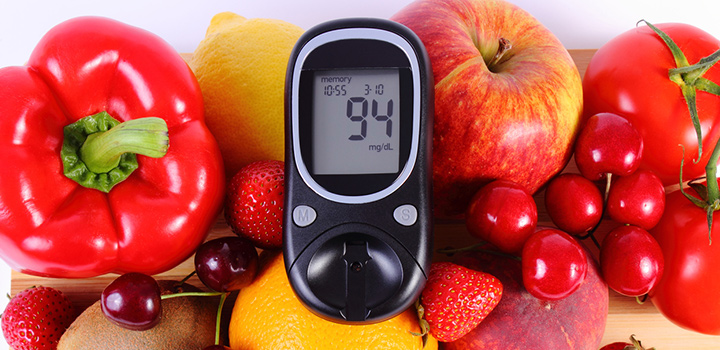Get a handle on your blood sugar levels with a healthy eating plan

If you're diabetic or prediabetic, eating right can go a long way towards staying healthy and keeping your energy constant throughout the day. Here are some pointers on what, when and how much to eat that'll help put a leash on fluctuating blood sugar levels.
Did you know that not smoking, following a balanced diet, and maintaining a healthy weight reduces the risk of diabetes by 90%? That's a hefty percentage - and all thanks to healthy lifestyle habits.
Remember, there are two types of diabetes: In type 1 diabetes, the body directly attacks insulin-producing cells; in type 2, the body's tissues gradually become less sensitive to insulin. This causes betacells in the pancreas to work harder and eventually break down.
Type 1 affects about 5% to 10% of the population with diabetes, but most diabetics have type 2 diabetes. While type 2 is also genetic, it's often triggered by lifestyle factors, and so is preventable. In particular, if a person is inactive or overweight, the pancreas battles to produce enough insulin to control rising blood sugar levels.
3 components that affect blood sugar levels
There are three basic nutrition components that affect blood glucose levels:
- The types of foods and drink consumed: High-fibre foods with a low Glycaemic Index (GI), such as whole grains, fresh fruit and vegetables should make up the bulk of your diet. A quarter of your plate should be filled with whole grains, a quarter with lean proteins and half with a variety of vegetables. At least five portions of fruit and vegetables are recommended daily.
- The timing of meals and snacks: Three meals a day with snacks in between is the best way to keep blood glucose levels steady.
- The quantities consumed: Portion sizes depend on a person's weight, activity levels, the type of medication used, gender, age and level of glycaemic control (blood sugar control). A dietitian can calculate a practical, nutritionally-balanced eating plan tailored for you by considering all these factors.
Losing weight can help manage rising levels
Having a healthy eating plan is especially important, as being overweight is a major risk factor for developing type 2 diabetes. The World Health Organization defines these body mass index (BMI) ranges for adults:
- Healthy weight a BMI of 18.5 to 24.9
- Overweight is a BMI greater than or equal to 25 to 29.9
- Obesity is a BMI of 30 or higher
The main cause of obesity and overweight is an energy imbalance between the kilojoules consumed and kilojoules spent - so in order to lose weight, you need to stay active and use up more than you consume. It's well worth the effort - studies show that losing just 7% of your body weight can increase insulin sensitivity by 57%!
But not all diabetes cases are linked to weight. Genetics also comes into play. People with diabetic family members are at higher risk. For them, even 2 or 3 extra kilograms can start a dangerous cycle leading to the disease. This makes weight loss an important goal for type 2 diabetics, and one of the most effective ways to start is drastically cutting down on your sugar consumption.
Sugar, we're doing down
Globally, there has been an increased intake of fizzy drinks and fruit juice. These drinks are energy-dense (high in kilojoules) and low in nutrition, so it's easy to drink too many. This is dangerous to your health because a 330 ml can of carbonated, sweetened soft drink contains about 40 g of sugar, and the same size container of sweetened fruit juice close to 45 g of sugar!
A review of research published in the journal Diabetes Care indicated that people who had one to two servings of soft drinks a day had 26% greater risk of developing type 2 diabetes than those who had no soft drinks or less than one a month.
So - less sugar, smaller portions and healthy meals at well-timed intervals all play a part in maintaining steady blood glucose levels. Keep diabetes at bay - chat to a dietitian or trained professional to tailor-make a healthy eating plan for you!
Get valuable info and access to professionals with DiabetesCare
The DiabetesCare programme helps you actively manage diabetes. It offers you access to various tools to better monitor your condition, as well as high-quality coordinated care through healthcare providers like dietitians and biokineticists.
Any Discovery Health Medical Scheme member registered on the Chronic Illness Benefit for diabetes can join the programme. Learn more or sign up here.
Related articles
5 reasons we buy what we do (and get fatter for it)
An obesogenic environment is one which is not conducive to weight loss, but rather one that promotes weight gain. The bad news is: we live in one. The good news is: we can fight it!
Do you live in SA's healthiest city?
If you reside in Port Elizabeth, alas the answer this year is no! Here's the lowdown on the 2017 Discovery Vitality ObeCity Index, which presents the latest insights on weight status and food purchasing behaviour across the country.
How food marketers target your kids (and how to counter it)
Coffee, cow's milk, fatty foods, wine – good or bad for you? Over the years, nutrition recommendations about what's healthy and what's not have swung from one extreme to another, leaving us hungry and confused!